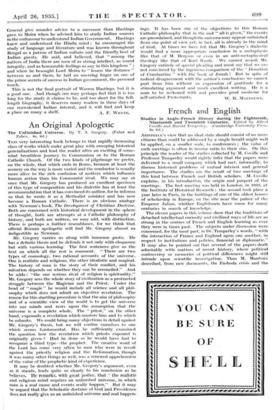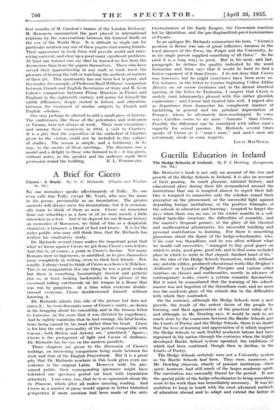French and English
Studies in Anglo-French History during the Eighteenth, Nineteenth and Twentieth Centuries. Edited by Alfred Coville and Harold Temperley. (Cambridge university Press. 8s. 6d.) ARISTOTLE'S view that an ideal state should consist of no more citizens than could be addressed by a single herald might well
be applied, on a smaller scale, to conferences ; the value of such meetings is often in inverse ratio to their size. On this principle the reader of the studies collected by M. Coville and Professor Temperley would rightly infer that the papers were delivered to a small company which had met, informally, to discuss historical problems of mutual interest and general importance. The studies are the result of two meetings of this kind between French and British scholars. M. Coville explains, in his introduction, the origin and purport of the meetings. The first meeting was held in London, in 1933, at the Institute of Historical Research ; the second took place a year later in Paris, in the buildings of one of the oldest homes of scholarship in Europe, on the site near the palace of the Emperor Julian, whither Englishmen have come for many centuries in search of knowledge.
The eleven papers in this volume show that the traditions of detached intellectual curiosity and civilized ways of life are as strong in the centres of French and English learning as ever they were in times past. The subjects under discussion were concerned, for the most part, in Dr. Temperley's words, " with the interaction of France and England upon one another, in respect to institutions and policies, financial or diplomatic."
It may also be pointed out that several of the papers dealt admirably with matters of recent history, where political controversy or memories of political differences might still intrude upon scientific investigation. Thus M. Mantoux described, from new documents, the Fashoda crisis and the
first months of M. Cambon's tenure of the London Embassy. M. Renouvin summarized the part played in international relations by the conversations between the General Staffs on the eve of the World War. It is difficult to single out for particular mention any one of these papers read among friends: Their appearance in book form will provide useful and inter- esting material, and clear up a good many significant problems. At least one listener can say that he learned no less from the discussions than from the papers themselves. Those who have served their apprenticeship in any craft or trade know the pleasure of hearing the talk or watching the methods of masters of their art. This spontaneity has not been lost in print, and the reader, for example, of Professor Basil Williams' comparison between French and English Secretaries of State and M. Leon Calien's comparison between . Prime Ministers in France and England in the eighteenth century will notice for himself the subtle differences, deeply rooted in history and education, between the treatment of similar subjects by French and English scholars.
One may perhaps be allowed to add a small piece of history. The conferences, like those of the potentates and statesmen at Vienna, were not always at work. There were excursions ; and among these excursions in 1934, a visit to Chartres. It is a pity that the exposition of the cathedral of Chartres given to the visitors could not be included in this volume of studies. The reason is simple, and a testimony, in its way. to the merits of these meetings. The discourse was a model and a delight to those who listened to it : it was given, without notes, as the speaker and his audience made their procession round the building. E. L. WOODWARD.











































 Previous page
Previous page